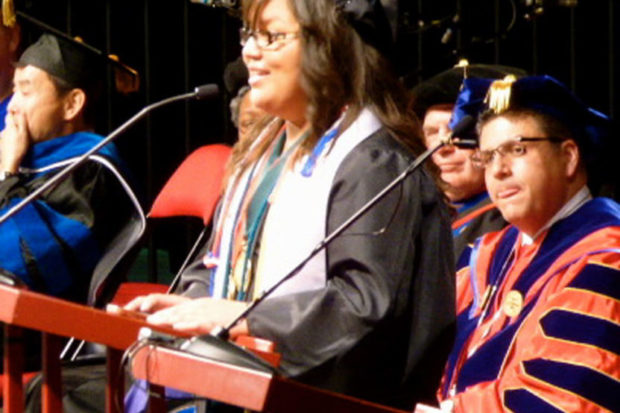
By Maria Ortega

For many of us, obtaining a higher education has become synonymous with great sacrifice. My mom, Patricia, traveled the path thousands prior had paved in order to give her two daughters a tangible future—especially an education. As a five-year-old girl, however, I was unaware of the brutal journey that would await us on the other side of the border. I was simply excited to be reunited with family (especially because as newly arrived immigrants we received lots of gifts from them). My mom knew it wouldn’t be easy, but we definitely weren’t prepared for all the hardships life would eventually throw our way.
As the years passed, I became close friends with the grief and feelings of sadness and hopelessness that had carved a permanent home within my fragile spirit. Growing up in a single-parent home is tough, and being the eldest child only amplifies the magnitude of the situation. My mom depended on me, and she wasn’t shy about it. We are a team; I depend on her like she depends on me, if not more. This relationship isn’t unique; it is one seen around the world, but few as critical as the interdependent relationship between two immigrant women.
Like many other Latinas, I was charged with being the caretaker of the family from a young age but unlike so many of my compañeras, I had an unparalleled support system. It wasn’t visible because my mom worked 14 hour days, but I knew she cared and wanted the best for me. She would reinforce the immense respect and admiration I had for her whenever she would set me aside, her face etched with permanent lines of endurance, and reminded me, with tears in her eyes, that I should never give up.
My senior year of high school came as quickly as it went and before I knew it, I was receiving acceptance, and rejection, letters. My academics and my involvement in my community secured me a place as one of 50 freshmen in the entering class of the Smittcamp Family Honors College at Fresno State. The scholarship not only paid my tuition but gave me privileges few others had. This allowed me to focus my efforts on advocacy instead of worrying about drowning in debt or having to rush to get to my third part-time job.
Throughout my time at Fresno State, I was able to branch out and get involved in a variety of social justice issues. My passion and research thus far has focused on the school-to-prison pipeline, an invisible force that pushes youth out of school and into prison.
I grew up poor in Calwa, a small neighborhood plagued with negative preconceived notions due to some “gang” activity, a symptom of poverty. It wasn’t too long before I began noticing that many of the young Brown and Black men of my community see their life as a dead end; many of them are convinced that they won’t live to be 25 and if they do, they will probably be behind bars. They don’t aspire to obtain a higher education because, in my ’hood, simply graduating from high school is a tremendous feat in itself.
Seeing these disparities keeps the fire within me ignited and propels me to continue pushing through, especially when the going gets tough. And it did. A lot. There were times I felt like I couldn’t do it anymore, but then the uttered words of defeat from the boys in my community echoed in my head, reminding me not to give up. Eventually, after four long years, all of our struggles and sacrifices culminated in a weekend chalked full of celebration.
On May 17, I was one of the more than 5,000 who stopped being a student and became alumni. I walked into the Save Mart Center to the thunderous applause of family and friends who had come to support their graduates. As the Dean’s Medalist for the College of Social Sciences, I was one of nine students recognized during the ceremony.
It’s a special celebration, not only because we’re graduating but also because this marks a huge milestone for our communities. In addition to our immediate family, there are cousins, uncles, nieces, grandparents and friends who travel from all over the state to see us walk. When I finally walked onto that stage, it wasn’t just my name that was being uttered but the hopes and dreams of my mom.
Never did I think that I, a working class Chicana from Calwa, would end up accumulating a rather impressive educational track record. I was always determined but being admitted into a doctoral program at an Ivy League university was beyond my wildest imagination because these institutions are usually reserved for those more privileged. However, when I stepped on Brown’s campus, I felt at home. I’ve worked really hard to get to where I’m at and while some may think I’m just entering the “Ivory Tower,” I think it’s important for all to know that when I step on campus, I’m bringing my community with me.
While at Brown, I hope to make meaningful change so that the road to a Ph.D. can be a little easier for marginalized groups, especially women of color, but for now I intend to relax, travel, enjoy life and do some more organizing!
*****
Maria Ortega, from Calwa, is a recent graduate from Fresno State and will be making Brown University a little more brown in the fall as a doctoral student in sociology. Contact her at maria_ortega@brown.edu.
